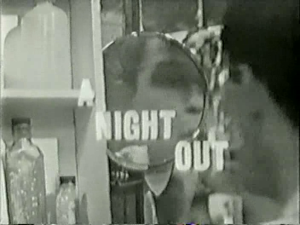
The Theatre of the Absurd is a post–World War II designation for particular plays of absurdist fiction written by a number of primarily European playwrights in the late 1950s. It is also a term for the style of theatre the plays represent. The plays focus largely on ideas of existentialism and express what happens when human existence lacks meaning or purpose and communication breaks down. The structure of the plays is typically a round shape, with the finishing point the same as the starting point. Logical construction and argument give way to irrational and illogical speech and to the ultimate conclusion—silence.

Harold Pinter was a British playwright, screenwriter, director and actor. A Nobel Prize winner, Pinter was one of the most influential modern British dramatists with a writing career that spanned more than 50 years. His best-known plays include The Birthday Party (1957), The Homecoming (1964) and Betrayal (1978), each of which he adapted for the screen. His screenplay adaptations of others' works include The Servant (1963), The Go-Between (1971), The French Lieutenant's Woman (1981), The Trial (1993) and Sleuth (2007). He also directed or acted in radio, stage, television and film productions of his own and others' works.
Mountain Language is a one-act play written by Harold Pinter, first published in The Times Literary Supplement (TLS) on 7–13 October 1988. It was first performed at the Royal National Theatre in London on 20 October 1988 with Michael Gambon and Miranda Richardson. Subsequently, it was published by Faber and Faber (UK) and Grove Press (USA). Mountain Language lasts about 25 minutes in production. It was most recently performed as part of Theatre of Menace (2016) at the Smock Alley Theatre in Dublin, starring Alisa Belonogina, Paul Carmichael, Lana O'Kell, Jaime Peacock, Louis Tappenden and Natasha Ryan

The Birthday Party (1957) is the first full-length play by Harold Pinter, first published in London by Encore Publishing in 1959. It is one of his best-known and most frequently performed plays.

One for the Road is an overtly political one-act play by Harold Pinter, which premiered at Lyric Studio, Hammersmith, in London, on 13 March 1984, and was first published by Methuen in 1984.
Family Voices is a radio play by Harold Pinter written in 1980 and first broadcast on BBC Radio 3 on 22 January 1981.

The Lover is a 1962 one-act play by Harold Pinter, originally written for television, but subsequently performed on stage. The play contrasts bourgeois domesticity with sexual yearning.

The Homecoming is a two-act play written in 1964 by Harold Pinter and first published in 1965. Its premières in London (1965) and New York (1967) were both directed by Sir Peter Hall. The original Broadway production won the 1967 Tony Award for Best Play. Its 40th-anniversary Broadway production at the Cort Theatre was nominated for a 2008 Tony Award for "Best Revival of a Play".

Awakenings is a 1973 non-fiction book by Oliver Sacks. It recounts the life histories of those who had been victims of the 1920s encephalitis lethargica epidemic. Sacks chronicles his efforts in the late 1960s to help these patients at the Beth Abraham Hospital in the Bronx, New York. The treatment used the new drug L-DOPA
Applicant is a dramatic sketch written by Harold Pinter. Originally written in 1959 and first published by Eyre Methuen in 1961, it was first broadcast on BBC Radio on the Third Programme "between February and March 1964," along with Pinter's other revue sketches, That's Your Trouble, That's All, Interview, and Dialogue for Three.

Tea Party is a play written by Harold Pinter, which Pinter adapted from his own 1963 short story of the same title. As a screenplay, it was commissioned by the European Broadcasting Union, directed by Charles Jarrott, and first transmitted on BBC Television in the programme The Largest Theatre in the World on 25 March 1965. It was first produced on stage in October 1968 as part of a double bill with Pinter's play The Basement.

A Night Out is a play written by Harold Pinter in 1959.
Victoria Station is a short play for two actors by the English playwright Harold Pinter.
Night is a dramatic sketch by the English playwright Harold Pinter, presented as one of eight short dramatic works about marriage in the program Mixed Doubles: An Entertainment on Marriage at the Comedy Theatre, London, on 9 April 1969; directed by Alexander Doré, this production included Nigel Stock as the Man and Pinter's first wife, Vivien Merchant, as the Woman (54). It replaced another sketch performed previously in the program We Who Are About To... at the Hampstead Theatre Club on 6 February 1969; each of the original eight sketches about marriage also featured two characters.

Landscape is a one-act play by Harold Pinter that was first broadcast on radio in 1968 and first performed on stage in 1969. The play shows the difficulties of communication between two people in a marriage. This is illustrated through the two characters who appear to be talking to one another though neither seems to hear the other. The dialogue resembles two independent monologues. The play is often studied, read, and performed alongside Silence, another one-act play published soon after Landscape. Both plays mark a change in Pinter's style, with echoes of the work of Samuel Beckett. In both plays nothing happens, the action of the plays is brought to a halt putting an added emphasis on the role of the dialogues and monologues that take place. As one critic put it "nothing happens but much is explored".
Bibliography for Harold Pinter is a list of selected published primary works, productions, secondary sources, and other resources related to English playwright Harold Pinter (1930–2008), the 2005 Nobel Laureate in Literature, who was also a screenwriter, actor, director, poet, author, and political activist. It lists works by and works about him, and it serves as the Bibliography for the main article on Harold Pinter and for several articles relating to him and his works.
Comedy of menace is the body of plays written by David Campton, Nigel Dennis, N. F. Simpson, and Harold Pinter. The term was coined by drama critic Irving Wardle, who borrowed it from the subtitle of Campton's play The Lunatic View: A Comedy of Menace, in reviewing Pinter's and Campton's plays in Encore in 1958.
Robert Winder, formerly literary editor of The Independent for five years and Deputy Editor of Granta magazine during the late 1990s, is the author of Hell for Leather, a book about modern cricket, a book about British immigration, and also two novels as well as many articles and book reviews in British periodicals. Winder is a team member of the Gaieties Cricket Club, whose chairman was Harold Pinter.

Martin Moran is an American actor and writer who grew up in Denver, Colorado.